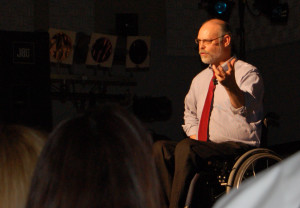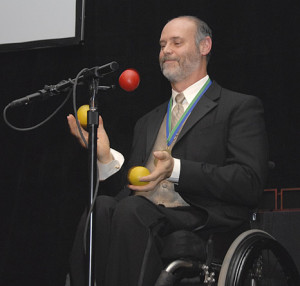My, What We've Accomplished!
Gary celebrates the amazing accomplishments of the disability community in fostering the greater inclusion of people with disabilities in modern society.
Since his spinal cord injury in 1973, he has been a direct observer — and beneficiary — of the truly historic changes that continue to unleash the potential of millions of people around the world.
In his travels and through his work, Gary has had the honor of meeting and working with many key players in the disability movement. He has learned a great deal from them, witnessed their accomplishments, talked in depth about the mission of achieving independence and full inclusion. Thanks to his personal experience as a person with a disability since 1973 and his place in the broader community, Gary is in a unique position to be an ideal spokesman for the Modern Disability story.
To book Gary contact him by email or call him at 415.491.4280.
Disability Community Talk Key Points
- WE Did It!
- History
- Historic Change
- The Future
- Breaking Down Stereotypes
- Self-Responsibility
- They Don't Get It
The historic transformations in our society that are unleashing the potential of people with disabilities were not a gift from progressive, insightful, generous politicians and policy makers. They have been hard won by people with disabilities themselves who organized and advocated and sometimes marched in the streets or occupied offices.
Meanwhile, the very access we have won (and technologies we have developed) have allowed more people with disabilities to become increasingly professional and sophisticated in their advocacy. These are smart, devoted, and experienced people who've learned the systems of government, and built the respectful relationships that have allowed them to have an influence on our political system and laws.
There are some remarkable key stories in the saga of the modern disability movement.
Judy Heumann was denied employment as a teacher because of her post-polio use of a wheelchair. She fought and won.
Ed Roberts was denied admission into the University of California Berkeley in the 60s due to his quadriplegia and iron lung dependence in the sixties. He not only fought and won, but with Heumann and other legends of the movement, established what became a network of Independent Living Centers across the U.S. He was ultimately appointed head of the CA Department of Vocational Rehabilitation, the office which tried to deny his tuition because they said he would never work!
To pass Section 504 of the Rehabilitation Act, which stated simply that the Federal Government and its contractors shall not discriminate against people with disabilities, the longest occupation of a federal building to this day occurred in downtown San Francisco to compel the Carter Administration to sign the regulations into law.
It's an amazing story. And still continuing.
We've achieved a much more accessible world. We've achieved communication options for people who are deaf or with impaired speech. We've allowed more people to live in their communities and get out of institutions (though that job is not yet done). We've designed technologies from sophisticated wheelchairs and athletic vehicles, personal transportation, and ways of interacting with computing, even for someone with no arms or sight. We've achieved civil rights under the law, by which we are protected from discrimination based on the fact of having a disability (again, more work to do on that one!).
Much of this work has been done by people who use chairs, who devoted themselves to engineering and design when they were either given old technologies that they knew fell short of what is possible, or when a solution didn't exist at all.
The momentum of what we've achieved is unstoppable. As we keep up the advocacy effort, and prove the value of providing the setting for us to live the full lives we deserve and contribute what we're able, the issues that remain at hand can continue to be addressed successfully.
There is still a great deal to do around providing community-based services, sufficient rehabilitation, funding for mobility equipment, accessible housing, and more. With the excellence of the disability advocacy community in place, and as people with disabilities themselves gain more and more confidence through their own successes — both as a community and personally — the future will be one of increasing inclusion and normalcy.
Normalcy, as in, one of these days it'll just be no big deal to have someone with a disability in any role society has to fill for which they are qualified and have found a way to perform it. As Justin and Yoshiko dart would say: Onward!!
Everyone has noticed that people with disabilities of all kinds are increasingly part of the daily scene. The more visible they are in public life, then the more progress we make in breaking down prevailing disability stereotypes. As the general population sees people who are highly active and clearly feeling just fine about themselves as people with disabilities, then the more authentic and whole they become in the collective mind.
Best of all, kids with disabilities are increasingly mainstreamed in public schools. When children grow up having direct relationships with kids with disabilities, the stereotypes don't even take hold. They get that these are people. Friends. They get what life is possible, and that they have the same feelings and desires as anyone else. There is real cause for hope that the stereotypes will continue to break down.
Having leveled the field to the degree we have, it's now possible for people to participate and contribute more than ever before in our history. This is true in our communities as full participants, as volunteers, and as employees and leaders in the workplace.
So now it's up to us. Having fought for all of these changes and successes, the best way to follow up — and build the momentum even further — is to get out there and prove what a great investment has been made. Fair or not, because we are still convincing society of who we are, we need to commit to a level of self-responsibility. We need to accept being held to the same standards as everyone else, such as behaving professionally in the workplace.
This is exactly what we have fought for: the right to sink or swim like everyone else, once the obstacle have been moved aside and the tools made available for us to succeed.
Gary's message to the disability community includes a plea to be patient with the people who don't get it yet. Poor souls. They get so uncomfortable being around us. It's not their fault that they say or do things that are patronizing or innapropriate!
To keep fostering the mission, we need to invite people into the conversation in a safe way. Some, of course, never will, but most people are open to having their thinking brought up to date — unless they feel accused or aggressively challenged.
One of Gary's great skills is to make the conversation safe, directing his anger at the work that remains to be done (and the lives that are still compromised) by translating it into passion for a clear message that anyone can understand.
Disability issues are eveyone's issues, and not just because it can become a personal reality for anyone at any time — or someone they love or care about. People want their taxes spent productively, so need to care about investing in independence. People want the best colleauges and leaders in the workplace to achieve success. And people want to know that, should it be them, they will have the right to pursue their highest potential in the context of their disability.
People get it when they hear Gary speak, and he urges disability audiences to engage with others in a way that allows them to see the real people we are, devoted to living real and productive lives.
Gary On Video
Invite Gary to speak at your event to honor and rally the troops with his message of celebration and hope.
Ray Grott
I was impressed by your comfortable stage presence, practiced and polished (though not slick) delivery, and the way you infused your talk with warmth and humor. Several attendees remarked that "this guy was really talking to us!"
Harrry R. Smith
I've been booking keynote presenters for sixteen years, and have picked some clunkers. In your instance, I was right on the money. I've heard only high praise for the compelling and entertaining way you closed our conference.




